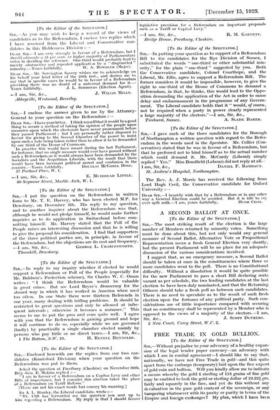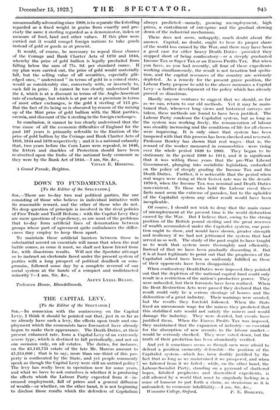FREE TRADE IN GOLD BULLION.
[To the Editor of the SPECTATOR.] SIR,—Without prejudice to your advocacy of a healthy expan- sion of the legal tender paper currency—an advocacy with which I am in cordial agreement—I should like to say that, nationally, we have not Free Trade in gold—and this quite apart from the embargo (temporary) laid upon the free export of gold coin and bullion. Will you kindly allow me to indicate a means whereby the gold £ sterling of 113 grains of fine gold may be enabled to look the gold or sterling dollar of 23.22k grs. fairly and squarely in the face, and yet do this without any devaluation in the pure gold content of the sovereign, or any tampering whatsoever with its parity or purity in terms of the Empire and foreign exchanges? My plan, which I have been
unsuccessfully advocating since 1909, is to separate the sterling regarded as a fixed weight in grains from exactly and pre- cisely the same £ sterling regarded as a denominator, index or measure of food, land and other values. If this plan were carried out it would compel foreign nations to take goods instead of gold or goods as at present.
It would, of course, be necessary to repeal those clauses of the Coinage and Bank Charter Acts of 1870 and 1844, whereby the price of gold bullion is legally precluded from falling below the sum of 77s. 9d. per standard ounce. If my plan were carried out, the price of gold would materially fall, but the selling value of all securities, especially gilt- edged ones, " understood " in terms of gold in a coined state, would as considerably rise, conversely with, or inversely to, such fall in price. It cannot be too clearly understood that the £, which is at a discount in terms of the Anglo-American rate of exchange, but which is at par or at a premium in terms of most other exchanges, is the gold sterling of 113 grs. But the fact of its being so is obscured by reason of the mixing up' of the Mint price of gold bullion with the Mint parities, nremia, and discount of the £ sterling in the foreign exchanges.
In conclusion, it cannot be too clearly understood that the true cause of all the economic difficulties of England for the past 107 years is primarily referable to the fixation of the price of gold bullion by the Coinage and Bank Charter Acts of 1816, 1844 and 1870 respectively ; and it is a national calamity that, two years before the Corn Laws were repealed, in 1846, the fetters and shackles of Protection should have been re-rivetted upon the limbs of the national body economic as they were by the Bank Act of 1844.—I am, Sir, &c.,



















































 Previous page
Previous page